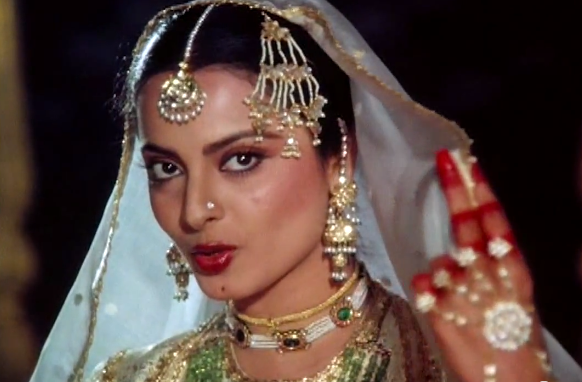I recently rewatched Muzaffar Ali’s masterpiece Umrao Jaan (1981), a film that is so brilliantly crafted that it deserves multiple posts on this blog like Pakeezah and Mughal-e-Azam. The film is based on an Urdu novel written by Mirza Muhammad Hadi Ruswa that recounts the life of one of South Asia’s most influential literary figures: Umrao Jaan. Born in Faizabad, a young girl named Amiran is kidnapped and sold to a brothel in Lucknow. As she grows older, Amiran is grooomed by the brothel’s madam until she becomes Umrao Jaan (played by Rekha), one of Lucknow’s most desirable courtesans. Misfortune after misfortune falls upon Umrao Jaan, but the film ultimately portrays her as a resilient woman whose beautiful mujras and poetry serve as a lasting legacy to her indomitable spirit.
In addition to Rekha’s stunning performance as the tawaif Umrao Jaan, this film is especially memorable for its portrayal of the richness of Lucknow’s cultural heritage. The indulgent life of nawaabs around the turn of 20th century is visually apparent in the film’s costumes, artwork, and set design, but the luxurious atmosphere in the film is taken to a new level by the soundtrack composed by Khayyam and penned by Shahryar. Here, I’ve chosen to translate one of the unforgettable mujra numbers from this film: in aa.nkho.n kii mastii.
In this song, Umrao Jaan engages in some self-indulgent vanity. She mildly chides her lover Nawab Sultan (played by Farooq Shaikh) by saying there are thousands of other madmen in Lucknow that admire her charm and beauty. In the third verse, she continues to brag by saying that all the taverns in the world cannot serve wine as intoxicating as the wine that she serves from her glances. Finally, in the last verse, Umrao makes a warning against those that attempt to suppress her grandeur using a common symbol found in Urdu-Hindi poetry: the moth. Like moths to a flame, she claims that there are thousands of admirers in the city who would sacrifice their lives to protect her. The poetry in this song is not overly complex, but there is a subtle beauty to it that is enhanced by Asha Bhonsle’s beautiful rendition and Rekha’s graceful expressions on screen. I managed to find a very high-quality print of this song on YouTube, so please do watch the link provided above and follow along with the translation/glossary–enjoy!
–Mr. 55
P.S. Whatever you do, please do not waste three hours of your life (like I did) watching J.P. Dutta’s 2006 remake of this movie starring Aishwarya Rai and Abhishek Bacchan. It is a travesty of a film that completely disrespects the beauty of the original. I think one of the worst parts is the atrocious Urdu pronunciations. I mean, even I can get the guttural khe sound right when I say “khudaa haafiz,” and they don’t pay me the big bucks. Why can’t Aishwarya or Abhishek? And let’s not even get started on Anu Malik’s tired and stale soundtrack…

The camera adds to the meaning of the lyrics here by bringing candles into the shot when Rekha sings “is shamm-e-farozaa.n…“
In Aankhon Ki Masti Ke Lyrics and Translation
in aa.nkho.n kii mastii ke mastaane hazaaro.n hai.n
The intoxicating beauty of these eyes attracts thousands of admirers.
in aa.nkho.n se vaabastaa afsaane hazaaro.n hai.n
Indeed, there are thousands of stories associated with these eyes.
ek tum hii nahii.n tanhaa ulfat me.n merii rusvaa
You are not the only one disgraced by your love for me,
is shahar me.n tum jaise diivaane hazaaro.n hai.n
There are thousands of madmen like you in this city.
ek sirf ham hii mai ko aa.nkho.n se pilaate hai.n
It is only I who can serve you wine with my eyes,
kahne ko to duniyaa me.n maikhaane hazaaro.n hai.n
Though it is said that there are thousands of taverns in this world.
is shamm-e-farozaa.n ko aa.ndhii se Daraate ho
Although you attempt to scare this bright candle with a storm,
is shamm-e-farozaa.n ke parvaane hazaaro.n hai.n
The light from this candle attracts thousands of moths.
in aa.nkho.n kii mastii ke mastaane hazaaro.n hai.n
The intoxicating beauty of these eyes attracts thousands of admirers.
Glossary
mastii: intoxication; mastaane: admirers; vaabasta: associated with; ulfat: love; rusvaa: disgraced; mai: wine; maikhaane: taverns; shamm-e-farozaa.n: bright candle; aa.ndhii: storm; parvaane: moths.



